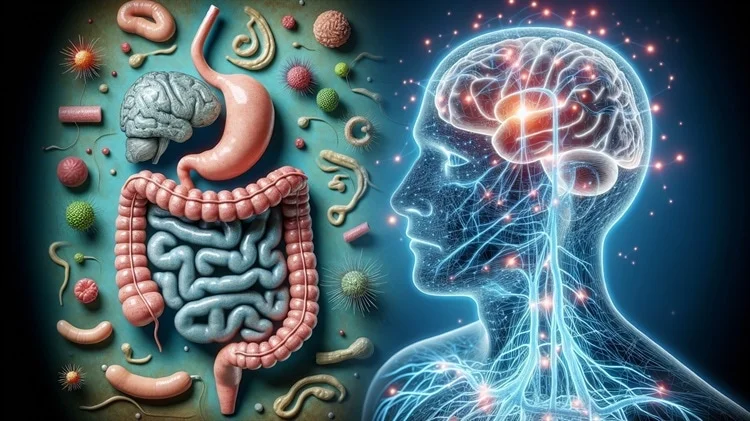
How Gut Bacteria Regulate Stress and Sleep Cycles
The gut, often referred to as the “second brain,” plays a crucial role in regulating various aspects of our health, including our mood, immune system, and even sleep patterns. Recent research has uncovered a fascinating connection between gut bacteria and our stress response, as well as their influence on the sleep-wake cycles. The microbiome, a diverse community of trillions of bacteria, fungi, and other microorganisms living in the intestines, has a powerful impact on the brain and body. Let’s explore how gut bacteria regulate stress and sleep cycles.
The Gut-Brain Axis: A Two-Way Communication System
The connection between the gut and the brain is called the gut-brain axis. This communication system involves both direct and indirect pathways that allow signals to travel back and forth between the gastrointestinal (GI) tract and the central nervous system. The vagus nerve, which runs from the gut to the brain, plays a significant role in this process. Additionally, the gut bacteria produce various chemicals, such as neurotransmitters and short-chain fatty acids (SCFAs), which can influence brain function.
One of the most well-known neurotransmitters produced by gut bacteria is serotonin, often referred to as the “feel-good” hormone. Approximately 90% of the body’s serotonin is produced in the intestines, where it can affect mood and stress levels. Disruptions to the balance of gut bacteria, known as dysbiosis, can lead to alterations in serotonin levels, influencing anxiety, stress, and even sleep.
Gut Bacteria and Stress Response
The stress response, which is controlled by the hypothalamic-pituitary-adrenal (HPA) axis, is significantly impacted by the gut microbiome. The HPA axis is responsible for regulating the body’s reaction to stress by releasing cortisol, a hormone that helps us respond to challenging situations. Studies have shown that an imbalance in gut bacteria can result in increased cortisol levels and an exaggerated stress response.
On the other hand, a balanced microbiome can help regulate the HPA axis and keep cortisol levels in check, reducing the physical and emotional effects of stress. Certain probiotics, for example, have been shown to lower anxiety and stress by influencing the gut-brain communication pathway. A balanced gut flora also aids in reducing inflammation, which is often elevated during chronic stress.
Gut Bacteria and Sleep Cycles
The microbiome also has a profound influence on sleep regulation. Gut bacteria play a key role in the production of melatonin, the hormone responsible for regulating the sleep-wake cycle. Melatonin is primarily produced in the brain’s pineal gland, but it’s also synthesized in the intestines by gut bacteria. Research has found that the gut microbiome helps synchronize melatonin production, thereby influencing sleep patterns.
Additionally, gut bacteria produce gamma-aminobutyric acid (GABA), an inhibitory neurotransmitter that helps calm the brain and promote relaxation. GABA plays a significant role in sleep initiation and maintenance. Imbalances in gut bacteria can lead to lower GABA levels, contributing to sleep disturbances such as insomnia and poor-quality sleep.
Furthermore, certain gut bacteria help metabolize tryptophan, an amino acid that is converted into serotonin and, eventually, melatonin. When gut bacteria are in balance, tryptophan metabolism is optimized, leading to improved serotonin and melatonin production, which in turn helps regulate the sleep-wake cycle.
The Impact of Dysbiosis on Stress and Sleep
Dysbiosis, an imbalance in gut bacteria, can disrupt the delicate communication between the gut and brain, leading to various health problems, including stress-related disorders and sleep disturbances. Factors such as poor diet, stress, lack of sleep, antibiotics, and other medications can cause dysbiosis. The consequences of dysbiosis can include chronic anxiety, depression, insomnia, and a weakened stress response.
Studies have shown that individuals with an unhealthy gut microbiome are more prone to conditions such as irritable bowel syndrome (IBS), anxiety, and depression. These conditions are often accompanied by disrupted sleep patterns, which further worsen the individual’s mental and physical health. Restoring a healthy balance of gut bacteria through diet, probiotics, and lifestyle changes can help alleviate these issues.
How to Improve Gut Health for Better Stress Management and Sleep
There are several ways to support gut health and promote better stress management and sleep quality:
- Eat a diverse, fiber-rich diet: A diet that includes a wide variety of fruits, vegetables, whole grains, and legumes can help nourish beneficial gut bacteria and promote a balanced microbiome.
- Include probiotics and prebiotics: Probiotics, found in fermented foods like yogurt, kefir, and kimchi, can help introduce beneficial bacteria to the gut. Prebiotics, found in foods like garlic, onions, and bananas, provide nourishment for these good bacteria.
- Avoid excessive sugar and processed foods: High sugar and processed foods can promote the growth of harmful bacteria and contribute to dysbiosis. Reducing sugar intake and focusing on whole, nutrient-dense foods can support a healthy gut microbiome.
- Manage stress: Chronic stress can have a negative impact on gut health. Practices such as mindfulness meditation, deep breathing exercises, and physical activity can help reduce stress and promote a healthy gut.
- Get enough sleep: Sleep is essential for maintaining a healthy microbiome. Aim for 7-9 hours of quality sleep each night to allow the gut to repair and restore itself.
- Consider probiotics or gut-healing supplements: If necessary, taking probiotics or other gut-healing supplements, such as prebiotics or L-glutamine, may help restore balance in the gut and improve sleep and stress response.